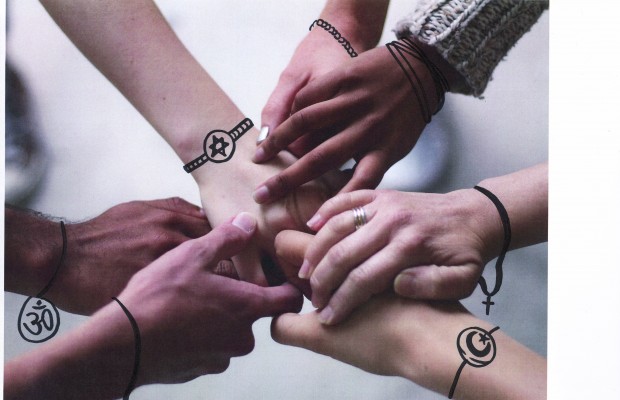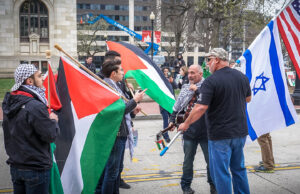Religious Rhetoric: Terrorists misrepresent Islam and work to inspire fear and division in the United States. It is up to us to prevent them from succeeding.

The United States prides itself on being a nation of acceptance, where people of different nationalities, backgrounds and religions can come together as one. However, this is a skewed perspective; since the 9/11 attacks, negative religious rhetoric has exponentially increased.
These perceptions have sparked a new debate on whether to grant refuge to people due to their religion, which has, in turn, lead to a change in America’s fundamental values. It has also led to the propagation of the belief that terrorists are representatives of Islam as a whole. Due to this change, Muslims are consistently targeted on the basis of their religion now more than ever. Innocent people are being associated with the acts of criminals without any justification.
When the tragedy of 9/11 occurred, the United States took steps to make clear that the individuals that committed the cruel act were not a representation of Islam as a whole. Those individuals were a group of radicals that took the Islamic religion and twisted it to conform to their own twisted ideals. Following the attacks, President Bush reassured the American people that “the enemy of America is not our many Muslim friends. It is not our many Arab friends. Our enemy is a radical network of terrorists and every government that supports them.”
In the past year, there have been attacks in Brussels, San Bernardino, and Paris, all perpetrated by terrorists connected to ISIS. In an election year, these attacks have been part of a broad conversation about national security, and this conversation is more often than not linked to Islam. In contrast with Bush’s response, current presidential candidates have responded with hateful rhetoric, connecting ISIS with the majority of muslims.
ISIS is a terrorist organization that has us in a constant state of fear. It is motivated by politics, rather than religion. It is an organization of megalomaniacs, disguised under the veil of religious martyrdom.
ISIS was started as a branch to al-Qaeda, and exploited the political instability during the Iraq War to make political gains. It also has operations in Syria, fighting a civil war against the authoritarian regime under Bashar Al-Assad. ISIS advances its power by exploiting the existing sectarian divide between Muslims to expand its power. This divide can (and does, in many places) exist without violence, but exists in Iraq and Syria due to their respective leaders’ failure to pass policies that ensure unity. ISIS aims to highlight this divide in order to push its own agenda, an agenda that exemplifies the worst of human nature.
Following the attacks in Paris on November 13, 2015, former presidential candidate Ben Carson said the attacks were “an organized effort to destroy Western civilization.” Senator and presidential candidate Ted Cruz (R-TX) called for police to “patrol and secure” Muslim neighborhoods after the attacks in Brussels on March 22, 2016, comparing them to gang turfs. Carson has called Syrian refugees, who are mostly Muslim, “rabid dogs.” Presidential candidates Donald Trump, Ted Cruz, and Ben Carson, have all asserted that admitting Syrian refugees into the United States is detrimental – because, to them, a radical group representing a very distorted view of a religion represents the members of the religion as a whole.
Trump, the frontrunner for the Republican presidential nomination, has called for the surveillance of mosques and has suggested he would create a database of muslims. However, Trump isn’t skeptical of violent Christians. Recently, Trump failed to immediately condemn an endorsement from David Duke, the former grand wizard of the Ku Klux Klan. In the name of Christianity, the Ku Klux Klan has bombed and assassinated American civilians on U.S. soil. The fact that the KKK does not represent Christianity is common sense. This understanding should extend to followers of Islam, who have the same relation to ISIS that Christians do to the KKK – if not a more contentious one.
Clearly, there is a double standard in America regarding religious violence. A Public Religion Research Institute poll found that only 19 percent of respondents thought that self-identified Christians who commit violence in the name of Christianity represent authentic Christians. However, the same poll found that a much higher 37 percent of respondents believed that self-identified Muslims who commit violent acts do so in the name of Islam and represent the religion as such.
This double standard is being fueled by the rhetoric of politicians. In November of 2015, when Robert Lewis Dear killed three and wounded nine at a Planned Parenthood clinic in Colorado, Cruz and Trump addressed the act in different terms. Cruz absurdly called Dear a “transgendered leftist activist,” while Trump denounced Planned Parenthood and called Dear a “maniac.” None of the candidates called Dear a terrorist. Dear described members of the Army of God, a Christian anti-abortion terrorist organization, as “heroes.” Despite reports of Dear praising those who had attacked Planned Parenthood clinics in the past as doing “God’s work,” he was not connected by any of the candidates to Christianity at all. Neither Trump or Cruz called for the surveillance of Churches, nor the patrolling of Christian neighborhoods. If only the same logic could be applied towards Islamic terrorist attacks.
On the other hand, candidates such as Hillary Clinton and Bernie Sanders have the task of repeatedly ensuring the American public that they do not have any prejudice against Muslims. During a foreign policy speech in New York City, Clinton urged the audience that, “Muslims are peaceful and tolerant people…and have nothing whatsoever to do with terrorism.” Sanders followed in suit expressing how we as a nation must stand together as one and put a stop to all forms of racism despite the fact that, “there is a lot of anger being generated, hatred being generated against Muslims in this country.” The fact that both Clinton and Sanders feel the need to guarantee Americans that they are not prejudiced against a specific religious group points to the overwhelming mood of fear that many public figures have generated. There should be no need for any candidate to constantly reiterate the lack of relationship between Muslims and terrorism.
An additional 2015 poll conducted by the Public Religion Research Institute found that 56 percent of Americans find Islam “at odds” with American values. A survey from YouGov and The Huffington Post showed that only 17 percent of Americans view the religion positively.
This negativity, catalyzed by terrorism, is ironically often expressed in the form of violence. Researchers from the California State University, San Bernardino’s Center for the Study of Hate and Extremism found that hate crimes against Muslim Americans have tripled since the Nov. 13 attacks in Paris. These crimes include assaults against students wearing hijabs, arson and vandalism in mosques, and the shooting of and death threats to Islamic owned business.
When we inspire hatred in the hearts of Americans, we inadvertently fuel an aggressive desire for revenge. People who feel alienated by their own country are the ones most susceptible to ISIS recruitment. ISIS doesn’t use religious scripture to recruit. It uses anti philosophies and propaganda, and it has been successful in doing so. For instance, 20 year old Hoda Muthana from Birmingham, Alabama, was first introduced to ISIS propaganda through social media. Muthana began to become increasingly affiliated with the radical ideology, and went so far as creating a Twitter account solely dedicated to contacting members of the Islamic State. In 2015, she left the United States to fight for the terrorist group. Her parents described her time in high school as a period of isolation. It is the people that experience this isolation from their own country that ISIS targets, on the basis that they will be given a purpose within the terror group. When we stereotype individuals, we give them more reason to join groups like ISIS. To avoid this – and moreover, to preserve our humanity – we need to ensure that we treat everyone with a sense of respect and basic dignity, without acting on prior judgments.
Along with social media, the negative rhetoric in the current presidential race fuels ISIS recruitment. Politicians often discuss Islam in the context of national security. However, too often this discussion is framed with antagonistic statements rather than actual solutions to the real security threats the country faces. With the rise of candidates like Donald Trump, Islamophobia in the West will continue to increase and ISIS will only get stronger.
Americans cannot let ignorant and misguided individuals inspire fear and fuel hate. When we allow a radical terrorist group which doesn’t represent Islam as a whole to play such a prominent role in deciding who can be considered an American, we are compromising our integrity, and we are aiding terror. Discrimination and stereotypes weaken the fabric of our nation, and it is imperative that the United States be a resilient and contrasting force against the radical terrorists groups that attempt to dismantle our nation. To do so, we must link hands instead of build barriers because unlike the terrorists, Americans know that there will always be peace and stability with acceptance and diversity.



